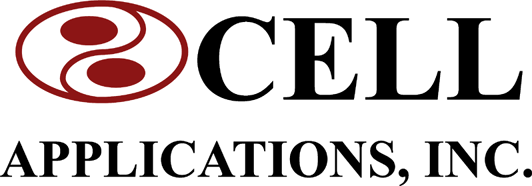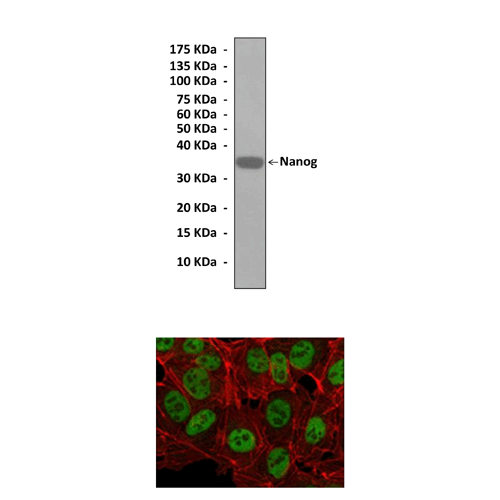Product Sheet CP10180
Description
BACKGROUND Nanog is a homeobox-containing transcription factor with an essential function in maintaining the pluripotent cells of the inner cell mass and in the derivation of embryonic stem cells (ESCs) from these. Furthermore, overexpression of Nanog is capable of maintaining the pluripotency and self-renewing characteristics of ESCs under what normally would be differentiation-inducing culture conditions. Concomitant with this essential function in pluripotent cell maintenance is its restricted expression pattern. Nanog transcripts first appear in the inner cells of the morula prior to blastocyst formation, are restricted to the inner cell mass in the blastocyst, and are no longer detectable at implantation. Expression of Nanog reappears in the proximal epiblast at embryonic day 6 and remains restricted to the epiblast as development progresses.1
Several extrinsic signals such as LIF, BMP and Wnt can support the self-renewal and pluripotency of embryonic stem (ES) cells through regulating the "pluripotent genes." A unique homeobox transcription factor, Nanog, is one of the key downstream effectors of these signals. Elevated level of Nanog can maintain the mouse ES cell self-renewal independent of LIF and enable human ES cell growth without feeder cells. In addition to the external signal pathways, intrinsic transcription factors such as FoxD3, P53 and Oct4 are also involved in regulating the expression of Nanog.2 Functionally, Nanog works together with other key pluripotent factors such as Oct4 and Sox2 to control a set of target genes that have important functions in ES cell pluripotency. These key factors form a regulatory network to support or limit each other\'s expression level, which maintains the properties of ES cells.3
Several extrinsic signals such as LIF, BMP and Wnt can support the self-renewal and pluripotency of embryonic stem (ES) cells through regulating the "pluripotent genes." A unique homeobox transcription factor, Nanog, is one of the key downstream effectors of these signals. Elevated level of Nanog can maintain the mouse ES cell self-renewal independent of LIF and enable human ES cell growth without feeder cells. In addition to the external signal pathways, intrinsic transcription factors such as FoxD3, P53 and Oct4 are also involved in regulating the expression of Nanog.2 Functionally, Nanog works together with other key pluripotent factors such as Oct4 and Sox2 to control a set of target genes that have important functions in ES cell pluripotency. These key factors form a regulatory network to support or limit each other\'s expression level, which maintains the properties of ES cells.3
REFERENCES
1. Cavaleri, F. & Schöler, H.R.: Cell 113:551-2, 2003
2. Amoils, S.: nature Rev. Genet. 7:587-8, 2006
3. Bhattacharya, B. et al: Curr. Stem Cell Res. Ther. 4:98-106, 2009
2. Amoils, S.: nature Rev. Genet. 7:587-8, 2006
3. Bhattacharya, B. et al: Curr. Stem Cell Res. Ther. 4:98-106, 2009
Products are for research use only. They are not intended for human, animal, or diagnostic applications.
Details
Cat.No.: | CP10180 |
Antigen: | Purified recombinant human Nanog fragments expressed in E. coli. |
Isotype: | Mouse IgG1 |
Species & predicted species cross- reactivity ( ): | Human, Mouse |
Applications & Suggested starting dilutions:* | WB 1:1000 IP n/d IHC n/d ICC 1:200 FACS n/d |
Predicted Molecular Weight of protein: | 35 kDa |
Specificity/Sensitivity: | Detects endogenous Nanog proteins without cross-reactivity with other family members. |
Storage: | Store at -20°C, 4°C for frequent use. Avoid repeated freeze-thaw cycles. |
*Optimal working dilutions must be determined by end user.
Products
| Product | Size | CAT.# | Price | Quantity |
|---|---|---|---|---|
| Mouse Nanog Antibody: Mouse Nanog Antibody | Size: 100 ul | CAT.#: CP10180 | Price: $413.00 |

